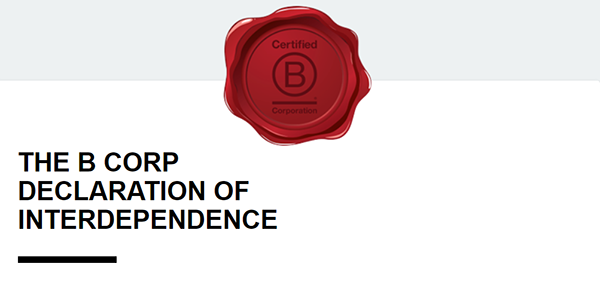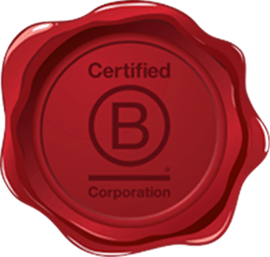Imagine if the business world got a makeover.
Freshened to reflect a new governing ethos. One that regarded community engagement related to global sustainability, diversity, corporate- and planetary responsibility on the same level of importance as profit maximization.
And, where all stakeholders were valued equally.

You don't have to imagine it, it's happening now. For multiple global companies it’s been inching that way for a decade, in fact.
Business leaders are no longer floating about ethical buzzwords to spruce up stodgy corporate images.
While many of them may still adopt words like ‘diversity,’ ‘sustainability,’ and ‘carbon footprint’ as mainstays of their mission statements and strategic visions, more and more company leaders are promptly turning this talk into purpose-driven action—directed toward their comprehensive suite of stakeholders—staff, management, community, shareholders, and the environment.
MISSION (IS)POSSIBLE
Meet the corporate crusaders known as the Certified B Corps—short for Benefit Corporations, a global movement encompassing action-based, purpose-driven, and accountability-centred practices related to global sustainability in business.
Executives from across an array of industry, Sandstone included, are rapidly backing the B Corp bandwagon and its fast-growing momentum created by its simple prescription: conduct and view business as “a force for good.”
“It is in any company’s best interest to attract new clients, new investors, new employees, new communities,” says CEO and Chief Investment Strategist Sharon Watkins.
“That attraction becomes tenfold when you reset your goals and corporate practices around making the world a better place in which to live and work.”
Being a B Corp starts with a leadership team's desire to make a lasting and public imprint in the way their business positively impacts their stakeholder community in the aforementioned areas.
After that, it’s all upside—good for business, good for the world.
SANDSTONE: EMBODYING THE B CORP MINDSET
Since 2016, Sandstone Asset Management Inc. has been successful in its commitment to meet the B Corp mission.
The firm is proud to be the first portfolio management company in Canada to achieve B Corp status and, for the third year in a row, has maintained its good-standing as ‘Top-10 per cent’ employer among B Corp’s ‘Best for the World’ companies.

Alberta, where Sandstone is located, also happens to be the fastest growing province in Canada for companies choosing to adopt B Corp certification into their business fold.
“The impact of our values on the community, both our internal employee community and our external stakeholder community, is second-to-none,” says Watkins, noting her and her team’s pride over its certification and accompanying Declaration of Interdependence.
Sandstone President Brent Pickerl, Watkins’ co-founding partner, attests B-Corp certification is much more than a piece of paper.
“It validates the responsibility and commitment behind the mission," he says, noting that becoming a B Corp equally supported his firm's ethos of seeking out diverse economies for clients.
“This new vision of corporate sustainability is turning the former fiduciary duties of upper management on their heads.”
BUSINESS AS A ‘FORCE FOR GOOD’— FROM THE C-SUITE DOWN
Watkins says being a ‘force for good’ has had a contagious effect on her team and its desire to raise the bar activating Sandstone’s community footprint.
She explains that her team’s competitive spirit of goodwill is consistently being reinforced among staff. Accountability systems built into B Corp’s certification process by parent company, B Lab, enables continual reassessment which, Watkins adds, helps companies, hers included, to “become the best versions of themselves,” while simultaneously upholding membership rigour.
When B Corp arrived on the global business scene, it provided a refreshing and accountability-based alternative to the fast-growing, complimentary ESG (environmental social governance) principles that were being touted by several companies looking to up their diversity and sustainability games.

To be sure, traction has been gained among both. But, make no mistake, B Corp is a movement unto itself. In a recent newsletter piece, 13D Global Strategy and Research wrote that clients and investors increasingly are expecting businesses to, “do more than talk about the impact they are having, [rather,] they want companies to walk the talk.”
This new vision of corporate sustainability having influence over global economies is reaching employees from the C-Suite down. It is also turning the former fiduciary duties of upper management on their heads.
As the 3 P's of people, planet, and profits capture companies' long-term outlooks for investment success and profitability, leaders are increasingly measuring business success on something more meaningful than ‘EBITDA’ or last quarter's earnings. They see their company's greatest strengths in the intangible, i.e., the goodwill and corporate citizenship their members embody (and continually aim to improve), both internally and externally.
Similarly, a growing number of investors and shareholders look to a company's corporate social-responsibility footprint as a barometer for their purchasing practices. They, too, are tired of jargon-y talk and the old notion that successful corporate governance rides on profit alone. Instead, they want to support companies with like-minded ethics and sustainability practices to protect the planet.

Sandstone's gold-standard stamp of approval comes from its strength in:
- Diversity in 'C-Suite/ownership structure
- Continued professional development
- Consistent education and growth opportunities
- Promoting active volunteering
- Open communication between upper management and employees
Since achieving B Corp status, Pickerl notes his company has been steadfast in its resolve to encourage business peers to do likewise.
“We believe that every company, large or small, can benefit from becoming a B Corp,” he says.
Additionally, he remarks, “the program’s mission to place community stakeholders’ interests at the forefront of their business is preferable—and more prudent—than ceding to split-second market pressures.”
Watkins likens a company’s ‘B Corp-ability’ to “setting your organization up as a knowledge centre for global and social responsibility.” This past summer, she presented at the Calgary Chamber of Commerce. Speaking to an audience of prospective B Corp companies, the Sandstone CEO reflected on the benefits of program membership and certification.
Said Watkins: “Being a vibrant partner in the community has, in effect, broadened our company’s mission by helping to bridge the gap between global investment accountability and community grassroots stewardship.”